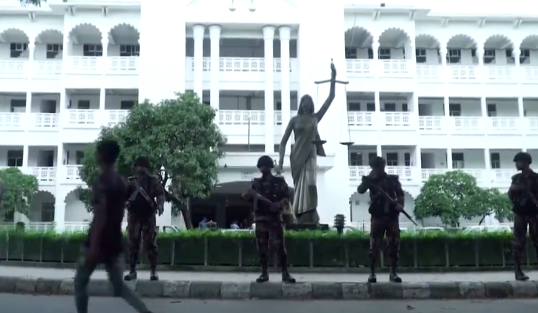Bangladesh’s top court has abolished most of the quotas for government jobs, a move that had sparked violent clashes and resulted in over 100 deaths. Previously, one-third of public sector jobs were reserved for relatives of veterans from the 1971 war for independence from Pakistan. The court’s ruling now limits this to just 5%.
Bangladesh’s Supreme Court scrapped most of the quotas on government jobs that sparked nationwide student protests in which at least 114 people died https://t.co/APVM6RU8Hf pic.twitter.com/0zwdmflKza
— grannywatchstocks (@grannystocks) July 21, 2024
Law Minister Anisul Huq confirmed the government would implement the ruling within days, despite some student leaders vowing to continue protesting. Mr. Huq dismissed claims that Prime Minister Sheikh Hasina was losing control, attributing the support of the mass population to the government’s efforts to end the violence. He accused opposition forces of exacerbating the unrest and damaging symbols of Bangladesh’s progress.
Protest coordinators have indicated that demonstrations will persist until their broader demands are met, which include justice for slain protesters, the release of detained leaders, restoration of internet services, and resignations of government ministers. The capital city, Dhaka, remains under curfew, with sporadic clashes continuing even after the court’s decision.
🚨 BANGLADESH SUPREME COURT SCALES DOWN JOB QUOTAS FOR FREEDOM FIGHTERS TO 5%, EMPHASIZES MERIT-BASED ALLOCATION 🚨 pic.twitter.com/KmfGvKNYt2
— Asian U.S. News (@AsianUSNews) July 21, 2024
The Supreme Court’s decision mandates that 93% of public sector jobs be filled based on merit, with 5% reserved for veterans’ families and 2% for ethnic minorities or people with disabilities. The quota system, originally scrapped in 2018, was reinstated by a lower court last month, triggering the protests. The government’s harsh response included curfews and a communications blackout, with allegations of brutality by police and the student wing of the ruling Awami League, which the government denies.
The protests have led to significant damage, including arson attacks on government buildings and police posts, and disruptions to Dhaka’s metro system. There have also been reports of detainees being mistreated, including Nahid Islam, a protest leader who was allegedly tortured.
Analysts suggest the quota system has been exploited by the ruling Awami League to reward supporters and entrench influence. The protests have grown into a wider movement against corruption, lack of accountability, and rising living costs. Mr. Huq denied the quota system disproportionately benefited the Awami League, stating that most party members were freedom fighters or their supporters.
Bangladesh court scraps most job quotas that caused deadly unrest: Reportshttps://t.co/kD0iSTp4dY pic.twitter.com/bwGf1Qkl9F
— ViV (@VivicusVipare) July 21, 2024
The unrest has spilled over into international demonstrations, with Bangladeshi students in the US protesting outside the White House and in Times Square. In the UK, clashes occurred in east London between pro- and anti-government groups, resulting in injuries and property damage.
Key Points:
- Bangladesh’s top court has reduced government job quotas for veterans’ relatives from one-third to 5%, sparking violent protests.
- Protests continue with demands for justice for slain protesters, release of detained leaders, restoration of internet services, and government resignations.
- The Supreme Court mandates 93% of public sector jobs to be filled on merit, with quotas for veterans’ families and ethnic minorities or people with disabilities.
- Allegations of brutality by police and the ruling party’s student wing have been denied by the government.
- Protests have extended internationally, with demonstrations in the US and UK involving Bangladeshi communities.
Fallon Jacobson – Reprinted with permission of Whatfinger News



